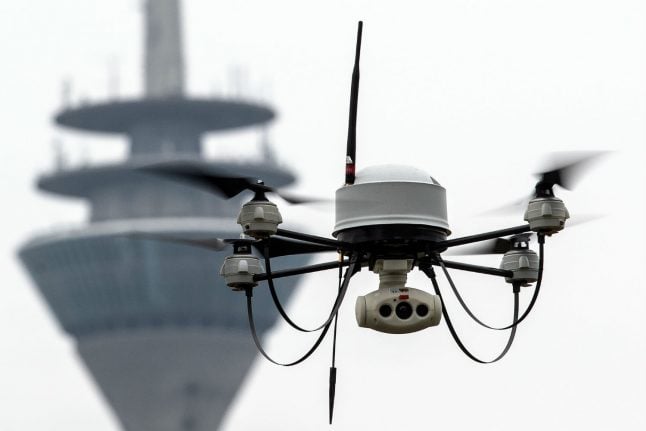The small flying objects issue health warnings at popular meeting points via loudspeaker, and alert authorities about social distancing rules violations.
Since the beginning of April, they have been deployed by three of Germany's 16 states as part of the fight to slow the spread of the coronavirus.
READ ALSO: German coronavirus cases 'stable' as leaders debate easing lockdown
Yet the country's police unions are discussing if they should be rolled out nationwide to assist authorities, whether through coronavirus rule enforcement or tracking down criminals.
In the western state of North Rhine-Westphalia, 10 police jurisdictions – including Düsseldorf and Dortmund – have deployed two drones each, a spokeswoman for the State Office for Central Police Services said.
The central state of Hesse has also been operating a drone to enforce restrictions, particularly in parks in Frankfurt.
In the northeastern state of Mecklenburg-Western Pomerania, the fire department has also put a drone into use in order to to survey individual beaches on the island of Rügen. The device, with its thermal imaging camera, could also detect barbecue parties, said a spokesperson.
According to Düsseldorf police, a drone has been in operation along the Rhine river, natural areas such as quarry ponds and the – currently empty – shopping mile Königsallee.
Yet the drone's camera is not used to identify individuals, said a spokesman for the Düsseldorf police.
“No pictures are stored either,” he said, adding that it was only for overview shots – especially in areas that were difficult to survey.
In all operations so far, police have observed that locals followed social distancing restrictions.
Throughout Germany, fines continue to remain in place for violating the enforced measures, which include being outside with more than one person who is not family or part of the same household, and not keeping a distance of 1.5 metres.
READ ALSO: State by state: How much do you have to pay for flouting Germany's coronavirus rules?
Other methods of surveillance
In many German states, the police currently use more conventional methods to monitor and enforce the restrictions.
For example, vehicles with loudspeakers are being used to patrol streets and point out the restrictions, said a police spokesperson in Lower Saxony.
However, she did not dismiss the possibility of using drones in the near future to monitor social distancing rules.
In the eastern state of Saxony-Anhalt, coronavirus restrictions were monitored in the air, but by helicopter. Over Easter weekend, for example, the planes surveyed whether people were holding Easter bonfires.
Bavaria, one of three German states with a full lockdown, has also said that it won’t be using drones, and according to the Ministry of the Interior, this could change in the forseeable future.
Authorities Baden-Württemberg, Hamburg and Brandenburg also stated that they would not use the small remote controlled planes for surveillance.
‘Very much welcome’ to a degree
Drone use for police surveillance remains a controversial topic in Germany.
On one hand, “he use of drones would be helpful and desirable in order to support emergency services”, German Police Union (DPolG) chairman Rainer Wendt told dpa.
From the point of view of the police union (GdP), drones can also be useful – but only in certain situations.
“We must be sensitive,” said GdP Deputy Federal Chairman Jörg Radek. “Drones are a new means of operation and could give many citizens the impression that we are on our way to a surveillance state.”
The police may only use drones for specific purposes, he said, to perform specific tasks.
“This excludes the possibility of an unprovoked, blanket deployment.”
'Let's not let up'
Current coronavirus numbers in Germany “have stabilised at a relatively high level,” Lothar Wieler of the Robert Koch Institute (RKI) for disease control told reporters.
“There is no clear sign at present that they're falling,” he added.
Politicians are waiting on every comment by the country's leading medical experts, as Chancellor Angela Merkel will hold a conference Wednesday with state premiers on whether and for how long to extend infection control measures.
“Let's not let up”, said Wieler at a press conference in Berlin.
As of 10 am Tuesday, there were over 130,000 confirmed coronavirus cases, and 3,194 deaths, according to data from Johns Hopkins University. Bavaria is the most affected state, with over 33,500 confirmed cases.



 Please whitelist us to continue reading.
Please whitelist us to continue reading.
Member comments